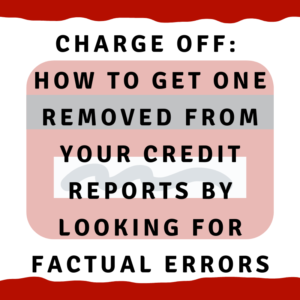Charge off: How to get one removed from your credit reports by looking for factual errors
Charge off: How to get one removed from your credit reports by looking for factual errors
We’ve talked about charge off debts in the past:
- What is a charge off?
- Can I be sued for a charge off debt?
- 3 things a creditor can do with a charge off
Now, let’s talk about how to remove a charge off from your credit report.
A charge off is the same as any other negative information on your credit report. You want to look and see if there is something or some things that are inaccurate. You are looking for errors.
A charge off is very damaging to your credit report assuming it is within the recent past.
You have to take the credit report and the recent account and study it closely from top to bottom and look at every single thing in there and ask yourself if this is 100% accurate, 100% correct. 95% correct doesn’t count.
We have a right to an accurate credit report. That means 100% accurate.
We take that account and study every single thing about it:
- Open date
- High balance
- Credit limit
- Date of last payment
- Payment history
Anything we find that is inaccurate, we write down. This is what will go into our dispute letter.
For instance, I have seen credit cards that typically follow a pattern of 20 days, 60, 90, 120, 150 days late and then at 180, it says charge off. Typically 6 months results in charge off with most creditors.
Sometimes we will see 30, 60, and then a charge off well before 180 days.
Or the charge off is correct, but we are months are wrong. In the report, it says 23 months ago we were 30 days late. Then 22 months ago it says 90 days late.
This is impossible and is clearly an error.
If the credit limit is inaccurate or is left off the report, this can be disputed.
It is fair for a company to report a charge off, and it is fair for the credit bureaus to report it, only if it is 100% accurate.
If it is not 100% accurate then it is fair for us to get rid of that.
Total up all of your notes. Send a letter to the credit bureaus and to the furnisher.
In your letter, tell them all the things I believe are wrong in your reports.
Tell them to investigate these errors and fix them. If they refuse to fix them, or cannot verify this information, then ask them to delete the errors.
I am not a credit repair business. My objective is not for people to pay me money and get rid of things whether it is accurate or not.
As a lawyer, I am looking at the report for inaccuracies. If there are true inaccuracies in the report, then we want to dispute that and leave only two possibilities.
- They fix it, leaving your report 100% accurate
- They do not fix it and I sue them for false credit reporting.
When they do not fix the error and we have proof, we show the judge, sue the collector and the bureau, get the credit report fixed, and get money for our client.
I send disputes only when I believe we have a legitimate basis. If they do not fix the issue, then we will sue.
I will not file suit if we do not have a legitimate basis to sue.
If the information is accurate, you will have no case, even if the bureaus fail to investigate.
We need the foundation of something false on the credit report. If there is something false we dispute it. If it doesn’t get fixed, we may dispute it again to give them an opportunity to fix it. When they don’t fix it, they dig themselves into a much deeper hole.
After several disputes, they may cross the line into willfulness or recklessness which allows us to get up to $1,000 per violation and punitive damages under the FCRA.
Perhaps my client is very upset by this error on the credit report, the jury may decide to give them $100,000 emotional distress. But then we could add $400,000 in punitive damages. And then attorney’s fees awarded on top of that. These larger numbers begin to get the attention of the credit bureaus.
If we do these disputes on things that are truly inaccurate, and they do not fix the issue, sometimes we sue immediately depending on the case. Sometimes we sue a second time. Third. The more chances we give them, the harder it is for them to explain themselves.
If we can help, call us at 205-879-2447 or fill out our contact form and we’ll get right back with you.
Thanks!
How much do you charge for a consultation
Lesly, we don’t charge for consultations — fill out our form here — https://alabamaconsumer.com/contact-us/ and let us know what your situation is and we’ll get right back to you thanks!
John Watts